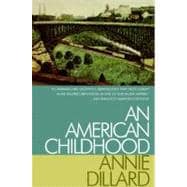About This Book
An American Childhood by Annie Dillard is a poignant and vivid memoir that captures the essence of growing up in Pittsburgh during the 1950s and 1960s. This book is a must-read for anyone who has ever cherished memories of childhood summers, rock collections, or the magic of discovering a book that was written just for them.
Who Uses It?
Primarily, this book is used by students and educators in literature and memoir courses at the college and university levels. It's also a valuable resource for anyone interested in understanding the complexities of childhood experiences and the power of storytelling. Parents and readers who appreciate memoirs will find this book particularly resonant as it explores themes of family, identity, and the importance of following one's passions.
History and Editions
First published in 1987, "An American Childhood" has been a beloved classic for decades. The book has been re-released several times, with the most recent edition available since 2013. This edition maintains the original's poignancy and vivid storytelling, making it a timeless read.
Author and Other Works
Annie Dillard is a Pulitzer Prize-winning author known for her lyrical and insightful writing style. Her other notable works include "Pilgrim at Tinker Creek," "The Living," and "The Maytrees." Dillard's writing often explores themes of nature, spirituality, and the human experience, making her one of the most respected voices in contemporary literature.
Detailed Information
ISBNs and Formats
Hardcover: ISBN-13: 9780060915186
eTextbook: ISBN-13: 9780060915193 (The ebook for "An American Childhood" is available right here on eCampus.com!)
eTextbook: ISBN-13: 9780060915209 (The ebook for "An American Childhood" is available right here on eCampus.com!)
Trade Paperback: ISBN-13: 9780060915186
Rental Options: Available through eCampus.com with various rental durations
Publication Details
Publisher: HarperCollins Publishers
Publication Date: October 15, 2013
Number of Pages: 272
Language: English
Item Weight: 0.484 pounds
Dimensions: 5.50 x 8.00 x 0.75 inches
Other Editions and Formats
Other editions of "An American Childhood" include hardcover and trade paperback formats. The book has been widely praised for its lyrical prose and poignant storytelling, making it a valuable addition to any literary collection.
Related ISBNs:
9780060915193
9780060915209
0060915188
Note: The ISBNs listed above are accurate and specific to the formats mentioned. Always ensure that rental options are available through eCampus.com for all listed formats.









